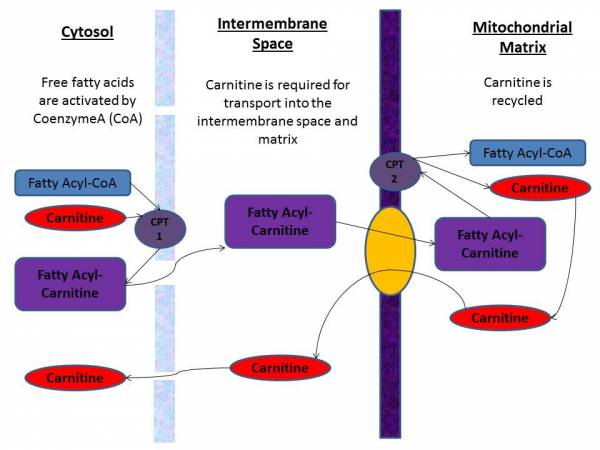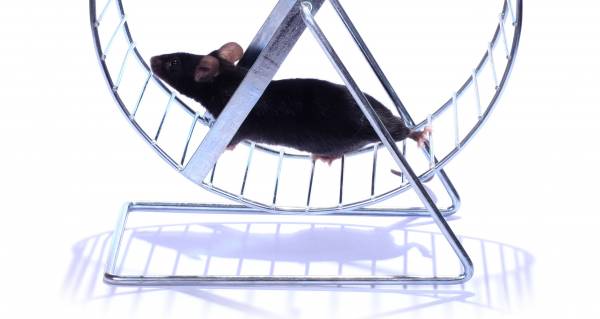Although we know there is no quick fix, many of us still like to experiment with supplements to see what will give us that extra edge.
If your goal is aesthetics and fat loss, carnitine may be a useful supplement for you as it aids in fat metabolism. If your goal is performance-oriented, carnitine allows the body to efficiently use fat as an energy source, so it may also be valuable to you.
What Is Carnitine?
Carnitine is a transport molecule synthesized naturally in the liver by a combination of the amino acids lysine and methionine. Carnitine is responsible for shuttling free fatty acids into our mitochondria for utilization as energy.
“A supplement of carnitine can ensure that mobilized fatty acids are burned as opposed to going back into adipose tissue as fat.”
During exercise, fatty acids are freed. This can result in weight loss if the fatty acids are burned in the mitochondria. Carnitine is present during this period, but tends to be the rate-limiting step in this process. Meaning, carnitine is not always present in large enough amounts to transfer all of the fatty acids mobilized during exercise. A supplement of carnitine can ensure that mobilized fatty acids are burned as opposed to going back into adipose tissue as fat.
Carnitine Transport and Exercise
The graphic below shows the cycle of carnitine transport. During exercise and throughout daily activities, adipose tissue releases fat in the form of free fatty acids to be utilized as energy. Macrophages and other energy-producing cells in the blood take up the fatty acids, but these molecules cannot cross the barrier into the cell or the mitochondrion without help.
Once the fatty acids accumulate in the blood, coenzymeA (CoA) attaches and activates the fatty acids, bringing them into the cell’s cytosol. A carnitine molecule then attaches, which allows the transporting receptor, carnitine-palmitoyl-transferase 1 (CPT1), to recognize and transport the fatty acid across the outer mitochondrial membrane into the intermembrane space.
Then, a carnitine-specific transfer enzyme in the inner mitochondrial membrane brings the fatty acid into the mitochondrion for breakdown by carnitine-palmitoyl-transferase 2 (CPT2), and the carnitine molecule is transferred back to the cytosol to shuttle more fatty acids.

But in times of high energy consumption, like a high-intensity interval training session, carnitine cannot keep up with the free fatty acids accumulating. In general, CoA is in great enough supply to keep up, but carnitine is not.
Dose and Side Effects
The recommended dose of L-carnitine (the active form) is 500-1,500mg per day, and supplements are available in liquid or capsule form. If you think carnitine may be a supplement for you, I recommend the liquid form. Diluting and sipping on the liquid supplement around meals and during and after exercise will optimize carnitine levels for fat metabolism and energy expenditure. Excess carnitine from supplementation is treated like excess amino acids by the body and excreted through the urine.
“Diluting and sipping on the liquid supplement around meals and during and after exercise will optimize carnitine levels for fat metabolism and energy expenditure.”
The side effects of supplementing with L-carnitine are rare, but an important one to be aware of is that carnitine can interact with the thyroid. It has been used to treat hyperthyroidism in the past, but if you have hypothyroidism (Hashimoto’s disease), make sure to take your carnitine supplement at a different time of the day than your thyroid medication.
What the Research Says
Although when taken correctly, carnitine supplementation should not hurt you in any way, it’s also important to consider if it will actually help you in any way. If carnitine was a miracle supplement, everyone would be taking it and it would be all over the news, right? So what does the science say about carnitine’s success?
Carnitine has recently been studied in overweight cats. L-carnitine is safe for cats and has been used in diet cat food. According to the study, the addition of carnitine in their food increased their metabolic rate and allowed them to lose weight faster than on regular diet cat food.
“Unfortunately, there are no human studies proving the success of carnitine for weight loss, but the purpose of carnitine is well understood and certainly can’t hurt if it is considered the rate-limiting step in fat metabolism.”
A similar study was conducted in rats, but the addition of carnitine did not show as promising of results. One reason for this might be that the first study was done on overweight animals, while the second was done with normal weight rats on a low-calorie diet. The bodies of the hungry rats were most certainly trying to hold onto fat stores as an anti-starvation mechanism.
Of course, this possible explanation has not been shown, but another study conducted in rats showed that supplementation with carnitine had the same effect in body weight and triglyceride levels as mild daily exercise.

Conclusion
Unfortunately, there are no human studies proving the success of carnitine for weight loss, but the purpose of carnitine is well understood and certainly can’t hurt if it is considered the rate-limiting step in fat metabolism.
If you are interested in trying an affordable supplement that will aid in fat metabolism, then L-carnitine might be one for you to try.
Further Reading:
- Carnitine Protects the Body From Intense Exercise
- Carnitine Suppresses Muscle Breakdown
- New Studies Investigate Carnitine Dose-Response
- What’s New on Pulse Beat Fit Today
References:
1. Mehta, Sweety. “Activation and transportation of fatty acids to the mitochondria via the carnitine shuttle“. Pharmaxchange.info. Retrieved 2014-02-01.
2. Elovson J, Vagelos PR. “Acyl carrier protein. X. Acyl carrier protein synthetase“. J. Biol. Chem. 243 (13): 3603–11.
3. Ehrlich, SD. “Carnitine (L-carnitine)”. University of Maryland Medical Center. Retrieved 2013-05-01.
4. Center SA, Warner KL, Randolph JF, Sunvold GD, Vickers JR. “Influence of dietary supplementation with (L)-carnitine on metabolic rate, fatty acid oxidation, body condition, and weight loss in overweight cats.”Am J Vet Res. 2012 Jul;73(7):1002-15. doi: 10.2460/ajvr.73.7.1002.
5. Brandsch C1, Eder K. Effect of L-carnitine on weight loss and body composition of rats fed a hypocaloric diet. Ann Nutr Metab. 2002;46(5):205-10.
6. Hongu N1, Sachan DS. Caffeine, carnitine and choline supplementation of rats decreases body fat and serum leptin concentration as does exercise. J Nutr. 2000
Photos courtesy of Shutterstock.






